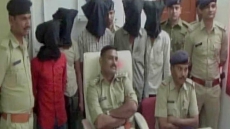The Kaur Project is a storytelling and photography website that highlights the lives, struggles, and achievements of Sikh women in North America.
What does Kaur mean to you?

“Kaur is part of all facets of my life. It resonates the most for me when its framed as overcoming obstacles and engaging with family, career, and health. The name Kaur gave me comfort and identity as I was growing up. I went to Punjabi school and being a Kaur provided a sense of community and belongingness during my teenage year. When I went to a non-Panjabi high school, I turned to my identity as a Kaur and knowing my roots helped overcome feelings of being different. Being a Kaur gave me strength.” - Beant Kaur
- - - - - - - - - - - - - - — - - - - - - - — - - - — — - - - — - - - - - — - - - - — - -

“The word Kaur means strength to me. In truth, I didn’t realize the power of this name until I started to draw connections in my life, especially with my mother. In my opinion, being a Kaur is no different than being a Singh. We are just as, if not stronger, than our male counterparts. I don’t think there is anything that can stop a Kaur from life. We have this immense fire in our hearts and that is what drives us, especially during challenging times. I would say being Kaur has an element of sacrifice, especially to ourselves because of the greater good. Sikh women have sacrificed a lot for our communities. Kaurs are more compassionate, I just think we have a few extra ounces of compassion.” - Bobby Kaur
- - - - - - - - - - - - - - — - - - - - - - — - - - — — - - - — - - - - - — - - - - — - -

“For me Kaur literally means whatever God provides us. Coming from a place where everything is taken away, having no money, no direction, it is my belief, my faith in something bigger that helps me to overcome the heartaches and rejoice in the goodness.” - Chanan Kaur
- - - - - - - - - - - - - - — - - - - - - - — - - - — — - - - — - - - - - — - - - - — - -

“The word Kaur is a deep and profound connection point. I frame it from the perspective of our collective experiences, as a gender, a genesis from this oneness that is pushing against capitalism. As a Kaur from this collective, through Sikhi, justice and everything that resonates from it, is how I live my life.” - Lily Kaur
- - - - - - - - - - - - - - — - - - - - - - — - - - — — - - - — - - - - - — - - - - — - -
“The name Kaur is an equalizer; enabling Sikh women to be able to identify themselves without their fathers or husbands,” says Jessie Kaur Lehail, a writer, story-teller, feminist and the proud co-founder of Kaur Project.
The Kaur Project is a storytelling and photography website that highlights the lives, struggles, and achievements of Sikh women in North America. Co-founders Jessie Kaur Lehail and Saji Kaur Sahota met in 2015 at a Women’s conference. They immediately bonded over feminism, identity politics, and their mutual realization that many women in Sikhism stood in the shadows of their fathers or husbands.

Through the project, Lehail and Sahota aim to create a safe space online for Sikh women to share their stories, each written in the first person, aiming to highlight the diversity within Sikhism. “We have seen a lot of feminist theory incorporated into mainstream media, but there’s been nothing specifically for and about Sikh women. So we created it,” says Lehail, further adding, “We wanted a safe place for women to share the untold stories of power and resilience from women who have the name Kaur.”
Lehail has worked on constructing the theoretical framework and website, meanwhile Saji has intertwined the theoretical framework with photographing each Kaur.
According to Lehail, Kaurs make up 48 per cent of the Sikh population but their voices are not heard enough. They are not on the mainstream of religious events and gatherings as leaders and their contributions in Sikh history are not talked about as much.
To date, the Kaur Project has catalogued 60 Sikh women, from diverse backgrounds. The first wave of stories poured in when Lehail and Sahota reached out to Sikh women in their own circles. The word spread soon and now Kaurs from across the world are showing interest in wanting to be a part of the project. “At first women were not certain why they were being asked about their names. I believe it’s because no Kaur has ever been asked, ‘what'’s your story?’ Then to have your picture taken and your story told, it’s a little intimidating,” shares Lehail.
The interviews happen over the phone in order to allow women to share detailed information openly with a sense of anonymity. “When I interview them over the phone that’s the first question I ask; how do you identify yourself? Usually they don’t have an answer and as we go through our 20-minute interview session. I ask them the same question again and they are usually able to identify themselves, which is such an empowering process,” says Lehail.
The creators have been overwhelmed by the response but feel that this is just the first step towards starting a larger conversation on colonialism; religion; the clash between parental expectations and lived existence; the experience of living between two different identities; self love; the reconciliation (or no reconciliation) of individual and cultural/religious feminism with that of mainstream feminism.
They want their project to play a role in educating mainstream society about Sikh culture and identity. In doing so, Lehail and Sahota feel that it is imperative to reflect and showcase the diversity in practice and interpretation of Sikhism and identification of the name Kaur. They also want to draw linkages between religion, academia and art in order for these themes and issues to reach a wider audience.
“We didn’t want to limit the project to Kaurs who wear turbans because it would create otherness within the Sikh religion, instead we chose to showcase the diversity within Sikhism,” states Lehail, who believes this project has been a self-exploratory journey for her and Sahota. They have grown along the way and are hopeful to continue.
“The experience of interviewing this diverse intersection of women has been a cathartic experience for Saji and I. We have been able to discover so much about ourselves and other Kaurs; as South Asian women, as Canadians, as Sikhs, daughters of immigrants, and the myriad of other identities we have, its been interesting to witness the unveiling of all these multilayers of identities,” concludes Lehail.




